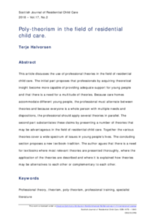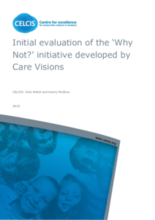Displaying 731 - 740 of 1510
These Standard Operating Procedures (SOPs) for the inspection and monitoring of Residential Homes for Children (RHCs) in Ghana are intended to provide guidance to National, Regional and District DSW Officers on how to plan, conduct and report on RHC inspection and monitoring visits and how to enforce directives to either address gaps in compliance with the Standards and/or to close the RHC.
The National Commission for the Protection of Child Rights (NCPCR) of India has formulated this Standard Operating Procedure (SOP) in order to address gaps in current policy regarding the death of a child in a Child Care Institution (CCI) and the duty of Child Care Institutions to address issues such as escape, runaway or sexual abuse of children in the CCI.
This article discusses the use of professional theories in the field of residential child care.
The objective of this article is to present a portrait of the baby factory phenomenon in Nigeria. The precipitating factors that fuel the trade are discussed, and suggestions for an enduring approach to combat this crime are offered.
‘Prepare for Leaving Care – A Child Protection System that Works for Professionals and Young People’, a two-year project co-funded by the Rights, Equality and Citizenship (REC) Programme of the European Union (2017-2018), aims to ensure that the rights of young people in alternative care are respected and that they are prepared for an independent life.
This study examines adult outcomes of youths (N=251) who spent time in a Dutch judicial treatment institution.
This article describes what could be learned from a project focused on monitoring the living group climate in a residential youth care service in Flanders, Belgium.
This short document provides a summary of initial learning from data gathered for an evaluation of the Why Not? initiative in Scotland. The Why Not? initiative within Care Visions services was started in 2014 to ‘improve the way young people are supported when ageing out of care, by offering a different experience of relationships beyond care.’
This review seeks to identify and summarise findings from literature about the nature of relationships that develop between older children and young people, and those caring for them within and beyond residential and fostering settings.
The purpose of the present Situation Analysis of Children with Disabilities in Albania is to generate comprehensive knowledge about children with disabilities to inform concrete actions by the Albanian government and UNICEF Albania to address the most critical rights violations of children with disabilities.






